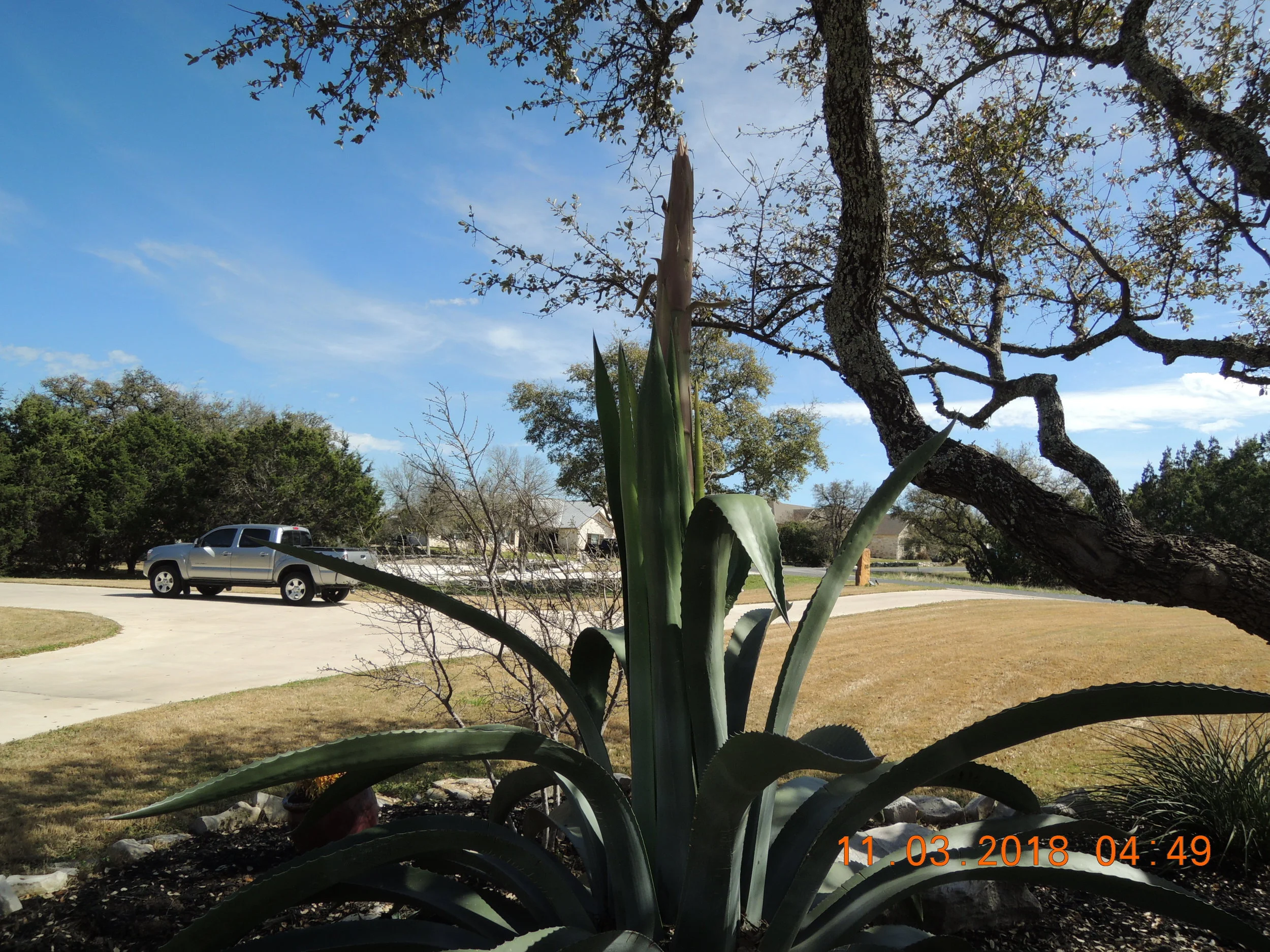The blue bonnets have begun to bloom. In a couple of weeks the entire countryside will be dressed in shades of periwinkle. Friends and family who’d like to visit us, three weeks from right now is when you want to come.
Last year about this time one of the two huge agaves out front bit the dust. Now the other one is in the first stage of its demise, which was inevitable. I don’t know the names of plant parts so I’ll just say that when it’s time for one of these agaves to die it shoots up an impressive phallic stalk. When the first one stopped growing, its stalk had risen through the branches and above the canopy of a good-sized oak tree, a height of about thirty-five feet. People stopped by to comment.
“You know when it does that, it’s fixing to die, right?” This from the fourth neighbor who wanted to educate us.
Sadly, we did know. When the obelisk lost its upward momentum, and all the elegantly curved leaves at the base had turned to brown mush, the problem became how to get the rotting thing out of there. It had once been a grand and dominating fixture, drawing admiration from everyone. But when it was fully expired the whole area was soggy and smelly from the decaying leaves.
Ordinarily a dead agave is simply left to dry out because the root ball is densely fibrous and staggeringly heavy. But our house is the first one people see when they enter the cul-de-sac; and as such, our front area is appropriately kempt. Leaving the stalk to turn brownish gray and list slowly sideways until it collapsed was out of the question. It would take years.
So David climbed a ladder and sawed across the stalk, creating vulnerably between top and bottom. As strategic advisor, it was my responsibility to repeatedly remind him to Be careful up on that ladder! He tied a rope around the top part, tied the other end of the rope to his truck, climbed in, and pressed the accelerator. And as the truck rolled forward the top of the stalk rattled and shook, then snapped off with a mighty crack! It fell through the branches, landing hard and pointing straight up; then falling over and almost hitting me because I was stupid enough to be standing right there.
David hacked off the putrid leaves and sawed at the bottom portion of the stalk until all that remained was the base, which weighed a couple of hundred pounds. He fastened a chain around it and, hooking the chain to the truck, pulled the mass out of the ground and on to the driveway, where, to my house-proud horror, it stayed for two weeks, which is how long it took to find someone willing to haul it off.
The whole process, from the time the stalk first appeared, to disposing of it, took about four months. And now we’re going to have to go through the same thing again. At least we know what we’re getting into.
Did the majestic agaves influence our decision to buy this house? It’s a possibility. They were certainly a magnificent element of the big picture. And I fear no plants will ever be worthy of replacing them.
Here’s an unusual snippet: A couple of years ago David was clearing the area around the agaves of the babies, several of which sprouted on a weekly basis. One of the needles pierced the back of his leather glove and pricked his hand. He immediately pulled the glove off and studied the painful area; but he couldn’t see a needle, though the swelling was immediate.
A few days later the hand was still swollen. He went to the doctor who looked at it and poked at it, and then said she was pretty sure there was no foreign object in there. She put David on antibiotics, but the hand continued to bother him—hurting and swelling until the skin of the whole hand was purple and strained.
This went on for several weeks, until suddenly it settled down. Fast forward eight months or so, when the palm of David’s hand became tender and inflamed—and then one day the tip of the needle popped out of his palm. This is all kind of gross, but it’s kind of cool, too, to ponder the inherent tenacity of the needle in remaining imbedded for that length of time, and maintaining its original integrity and purpose in what, to it, was an alien environment.
Good-bye, agave. We’re glad we got to enjoy you for a while.
Another one bites the dust. Day one.
Day two. That's about a foot of growth in a single day.
Of course he kept it. It's part of him now.
This little lime sizzler will never live up to the agave.





